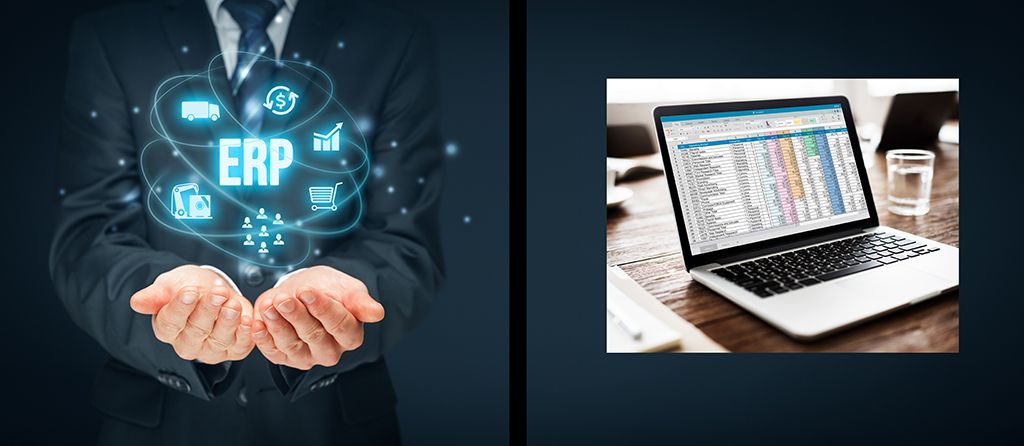Excel, or spreadsheet applications like Google Sheets, are often the first data management tool reached for by manufacturers just starting out. Spreadsheet applications are usually already installed on your computer or are accessible for free, and they seem like an easy way to organize data. These tools may be able to get companies started, but growing manufacturers often sabotage their capacity to expand by holding on to applications that cannot support their evolving needs. Excel is a great spreadsheet platform, but manufacturers need the sophisticated tools of Enterprise Resource Planning (ERP) to take their business to the next level. Here’s why an ERP beats Excel any day as a reliable application for expanding manufacturers.
Excel Puts All Your Eggs In One Basket
Manufacturers end up using Excel or Google Sheets because of convenience but using them comes with a fair amount of anxiety. Usually companies have one master spreadsheet (or perhaps a few) that contains essential information and historical data. In a spreadsheet, it is incredibly easy to erase data, especially when so many people are constantly going in and out of the file. That’s why Excel users tend to have backup copies of their master spreadsheet, but these files can get corrupted, or you could accidently miss a mistake and then back up the latest (incorrect) version of the file.
Frequently, master spreadsheets have one person who “owns” the document. This person manages the file’s formulas (which no one is allowed to touch!) and understands how the spreadsheet works. These staff are usually very territorial over ownership of the spreadsheet and have trouble explaining all the little nuances of the document to others. This gatekeeping of knowledge makes it hard to foster collaboration, but even worse, what happens if the person who controls the spreadsheet leaves? Your organization should never be dependent on one person or one file.
With an ERP, you don’t need to be afraid that the slip of a finger or the loss of one individual will destroy your business. By setting up access credentials and user permissions, you create data visibility while only allowing necessary individuals to edit sensitive data. In addition to protecting your data, this also protects your customer’s confidential information. To find and implement the right ERP, look to an ERP consultant like Datix. With 25 years’ experience and a business-first approach, our team takes the time to understand your business processes so we can recommend the system and strategy to take your business to the next level. Learn more about implementing an ERP with Datix.
Excel Is Hard to Use
At first, using Excel or a spreadsheet application seems easy. However, as your company grows more complex, your master spreadsheet will gain more and more columns and rows of data. It is unwieldly to attempt to track everything from one spreadsheet when you literally cannot see all of your columns at the same time. Reviewing data in column B and column BC simultaneously means that you need to hide or moving columns, but this makes the document unwieldy and risks messing up your master spreadsheet. Instead of operating out of a spreadsheet, growing manufacturers should invest in an ERP to make their lives easier and offer their companies new functionalities.
A spreadsheet system requires all your data to be manually entered. Manual data entry is time-consuming and results in inevitable human errors. With an ERP, you can automatically input data quickly and reliably, like tracking inventory using barcode scanners. A well-designed ERP system will also have s an intuitive interface, so you can quickly see the information you need. In addition, ERPs have a variety of features that would be a huge challenge to set up in a spreadsheet. These include calculators to help you price or quote, supplier bid analysis, forecasting functionality, capacity planning tools, and other invaluable resources. A spreadsheet simply can’t compete. Talk to Datix to transition from spreadsheets to an ERP system. As a one-stop shop, we offer manufacturers comprehensive solutions that can include ERP, CRM, business intelligence, disaster recovery, and more.
Excel Does Not Offer Real-Time Data
One of the biggest disadvantages of Excel for manufacturers is that spreadsheets can’t give you real-time data. Because everything must be entered by hand, your data is only as current as your last manual entry. If you depend on spreadsheets, you are forcing your team to either waste hours updating information constantly or to work blindly because you don’t have current data for making decisions or identifying problems.
Instead of fighting to keep up with data entry, an ERP makes accessing real-time data simple. As we mentioned, many pieces of data can be automatically updated in your system to save you time. In addition, it is simple to answer customer questions or anticipate their needs by looking at their order history. You can also identify production problems sooner because your system will allow your managers to see anomalies as soon as they happen. In fact, you can set alerts to notify staff if certain numbers are outside of an identified acceptable range. Don’t fall behind because you lack real-time data for informed decision-making. Talk to Datix about finding the right ERP solution for your business. Our team will support you during every stage of your ERP journey, from the planning to the implementation and beyond.
Wrap Up
Excel is a useful application, but spreadsheets simply can’t compare with the benefits of an ERP solution. Companies that hang on to old systems and outdated ways of doing business are setting themselves up for failure in this highly competitive environment. Let your business expand by taking advantage of an ERP.
Find out our 10 Tips for Implementing a New ERP
About Datix
With 25 years of experience, we understand what it takes to maximize ERP. Datix will work with you to understand your unique business needs to support your goals. Our team of experts promises to be by your side throughout your implementation and beyond.


